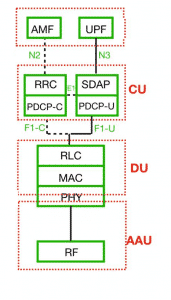In the 5G era, considering the trend of RAN virtualization, cloudization and centralization, and in order to reduce the fronthaul capacity and delay, the 5G base station has been restructured, mainly split into three parts:

- RU: This is the radio hardware unit that coverts radio signals sent to and from the antenna into a digital signal for transmission over packet networks. It handles the digital front end (DFE) and the lower PHY layer, as well as the digital beamforming functionality. the key considerations of RU design are size, weight, and power consumption. They are Deployed on site.
- DU: The distributed unit software that is deployed on site on a COTS server. DU software is normally deployed close to the RU on site and it runs the RLC, MAC, and parts of the PHY layer.
- CU, the central unit, mainly includes RRC, SDAP, and PDCP protocol layers, and is mainly responsible for non-real-time RRC, PDCP protocol stack functions.
- The CU can be deployed in the cloud to support the integrated deployment of core network UPF sinking and edge computing. The CU and DU are connected through the F1 interface. One CU can manage one or more DUs
The DU is responsible for real time layer 1 (L1, physical layer) and lower layer 2 (L2) which contains the data link layer and scheduling function.
The CU is responsible for non- real time, higher L2 and L3 (network layer) functions.
Benefit from Massive discount on our 5G Training with 5WorldPro.com
Start your 5G journey and obtain 5G certification
contact us: contact@5GWorldPro.com


